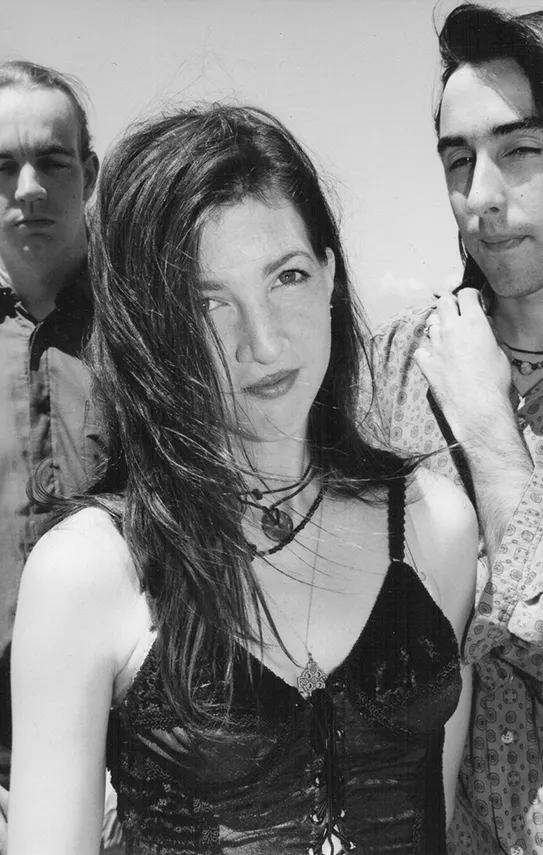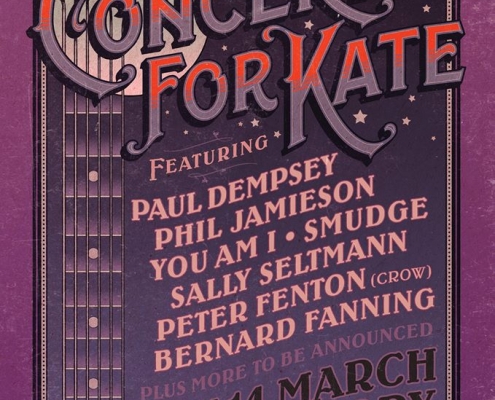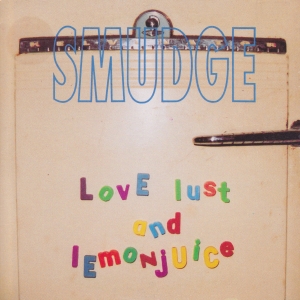Swirl
Swirl formed in 1990 on the Northern Beaches of Sydney and, after playing at an ‘open mic night’ at the Lansdowne Hotel, attracted the attention of Nic from the Half a Cow label (who was mixing all the bands that night). The original line-up, which lasted from 1990 to 1997, was Ben Aylward on guitar and vocals, David Lord on drums/occasional keyboards and Nicola Schultz on bass and vocals.
Their first recording was a song called “Burning Castles” on Half A Cow’s 7 inch Slice compilation which was released in 1991 and showcased the new breed of Sydney bands (that came in the wake of the success of Ratcat and The Hummingbirds and the recent touring of international acts such as Sonic Youth, Ride and My Bloody Valentine). Swirl instantly became local favourites with their split-personality sound of heavy, sonic-induced epics and cruisy, acoustic-based pop songs.
Playing support act for nearly every band that came through town, managed by Stephen Pavlovic (under the name of Magnet Promotions) and being chased by Chris “Sorry Nic, but I’ve got the cheque book in my back pocket!” Dunn from Waterfront Records, it was all looking great for this very new band. Waterfront were very interested in signing up Swirl but the band decided to stay with the new and energetic Half A Cow label, which was still being operated out of the bookstore at 85 Glebe Point Road.
Swirl recorded their debut release – a 12 inch EP (with Nic as uncredited producer) that showed both sides of their music, “People I Know” heading off one side and the amazing “Breathe” on the other, and then began work on an album which would include two songs from the 12 inch. Meanwhile, Magnet Promotions released a 10 inch record called Fresh From The Womb with all their roster on it in 1991 and included “Feel” by Swirl (along with tracks by Crow, Nunbait and Tumbleweed) and was packaged in a very tasty origami-style fold out cover.
Making history by being the first ever Half A Cow compact disc, Aurora is a stunning album that quickly sold out its first pressing (distributed by Shock Records before HAC did a deal with Regular Records, it has been deleted since 1993) and gained the attention of Dirt Records from Chicago, USA. Dirt were originally called Aurora and the similar title of Swirl’s album caught their attention. Their first US 7 inch, “Fade Away” (which came with a packet of real Australian dirt) was released in November 1993 and was followed by two cds which spanned their career to date (described as “pure melodic noise guitar – Sonic Youth meets Galaxie 500” in an early Dirt bio). Meanwhile, back in Australia, a single had been released from Aurora called “Tears” followed by an EP of new material called Touch.
The band had a triumphant trip of The United States in 1993 (playing support to the likes of Luna, Versus and Yo La Tengo), coming back with management deal in New York and glowing reviews from their tour and CMJ Music Seminar sojourn. CMJ highlighted them as one of the 15 ‘buzz bands’ in the world at the time and a live review in Minneapolis described their set as “Evenly paced, alternating between powerfully executed sonic sculptures and easily absorbed pop. I was simply stunned by their performance.” Swirl also completed their first full-length album The Last Unicorn which was recorded in Australia at Festival Studio with Mark Thomas and mixed by both Lou Giordano at Fort Apache in Boston and Tim Whitten in Sydney.
The Last Unicorn was released in May of 1994 and gained many fantastic reviews across Australia and later, from the Dirt release, in the US. The Drum Media wrote “The Last Unicorn as a first album is special, and as I said before if they came from Boston or Middleborough there’d be many falling over themselves to laud their greatness. But through a weird accident, they’re ours – appreciate them now.” In a round-up of the 100 greatest albums of the 1990s, Roger Grierson (Australian music svengali) put the album in his top ten and it was the most added record to American College radio upon its release in the US. The album showed some new sides to Swirl – the beautiful and haunting vocals of bassist Nicola and the addition of strings, which added to the grand sweep of their style. Swirl returned to the US for a more extensive tour, again playing at the CMJ seminar.
Unfortunately, The Last Unicorn was released at the same time that Half a Cow was prematurely ending its contract with Regular Records and didn’t get the support it deserved. A new deal was struck with Mercury Records for the label with a re-release of The Last Unicorn as a priority for the new partnership, hence a new record cover and a different track running order. The title track was released as a single (The Last Unicorn EP), which was played heavily on the national radio station Triple J, and contained a cover of Nick Cave And The Bad Seeds “The Ship Song”.
The remainder of 1995 and for most of 1996 was a very quiet and frustrating time for Swirl. While spending a lot of time and money recording demos for a second album for Half A Cow/Mercury, the band released a four song EP called “On My Own” which showed the changes from their previous recordings. Nicola stepped up to share the spotlight (writing and singing two tracks), David’s growing use of keyboards and a more sparse and arranged production was evident overall (courtesy of producer Tim Whitten) to make this a very accomplished release with the title track receiving strong critical acclaim and national airplay on Triple J. Problems with Mercury Records not wanting to fund the Half A Cow label put a stop to the recording of their next record and the band were released from its contract.
Swirl’s longtime sound engineer, Fraser Stuart, was also in the band for a year between June 96 and July 97 on bass and keyboards and also introduced the band to sequencing/sampling. 1997 was a time of transition for the band with the amicable departure of Nicola Schultz and the addition of two new members – Richard Anderson (bass, keyboards) and Keira Hodgkison (vocals, guitar). This resulting line-up unleashed a wave of creative energy enabling the band to reinvent and re-define itself, whilst still retaining its distinctive sound. The band also left Half A Cow to sign directly with the rejuventated Festival Records (headed by long-time fan Roger Grierson) and started recording more demos (yet again!) for a follow-up to “The Last Unicorn” – a wait for fans of three years since the “On My Own” EP.
This metamorphosis saw the band shed its indie tag and transform itself into a lush and sophisticated pop band. The finely-honed songwriting skills are evident in the new-found partnership between Ben and Keira and a new single was released on Festival called “Time” – written by Keira/Swirl and produced by Daniel Denholm (The Cruel Sea, Earthmen) – which was released in May 1999. Their long-awaited second album Light Fill My Room came out in 2001 and the band broke up the following year.
In 2016 Cherry Red in the UL released a five CD boxset called Still In A Dream – A Story Of Shoegaze which included Swirl’s “The Last Unicorn” (the only Australian act to appear).
In 2017 an online-only collection of non-album, unreleased and live songs came out called Satellites. One of the unreleased songs was “Brand New Day” featuring Sean Andrews. “We were working on new songs in Daniel Denholm’s home studio. I’d been getting vocal lessons from Sean Andrews, a classically trained tenor and he attended my vocal session. Upon its completion, at Daniel’s suggestion, Sean did a couple of improvised takes, and this cassette version that I had recently digitally converted for posterity seems to be the only copy. I sent Sean a copy. He told me he remembered the session often and how much he enjoyed it. Good memories. I think this was my last recording session in Swirl. Ben and David went on to record a new version as “Swirl mark 2” which is on the Light Fill My Room album.” – Nicola Schultz (June 2019)
In 2019 Library Group Records licensed The Last Unicorn from Half A Cow on double vinyl. In 2020, Half A Cow released a digital single “Change” that originally came out on a seven inch single with Lemon magazine in 1993.
Pics
Video
Buy Music
This Smudge Is True
Don’t Want To Be Grant McLennan 7″
Love Lust and Lemonjuice EP
Don’t Want To Be Grant McLennan 7"
Don’t Want To Be Grant McLennan 7″ (moo04)
released November 1991
A: Don’t Want To Be Grant McLennan
B: Stranglehold / Focaccia
Recorded at Troy Horse Studio, Newtown (8 track). Produced by Nic Dalton, Engineered by Michael Levis. Cover photo by Robyn Murphy.
The 2018 digital release includes “Dabble” and “Spawn” which appeared on the Shock UK vinyl/cd releases of the single from 1992.
Reviews
This Smudge Is True
Review by Chris Familton
Nic Dalton has compiled all the golden moments of Smudge’s career between 1991and 1998 in a twenty-seven track summation of a band that straddled the 90s and epitomised the best and worse of music during that period.
The Lemonheads connection has always been a blessing and a curse for Smudge. Sure it brought attention to their music that they may not have otherwise attracted. It also meant that comparison with Evan Dando’s songs was unfairly laden on the band. Tom Morgan and Dalton became members of The Lemonheads in 91 with Morgan co writing much of the classic It’s A Shame About Ray album. There is therefore a strong whiff of familiarity when hearing some of these non-Lemonheads songs for the first time. There is the ever-present jangly acoustic strum and sing-song super catchy vocal melodies that were hallmarks of both bands. Included are Down About It, The Outdoor Type and Tenderfoot that mark the magical intersection between both bands.
Elsewhere on This Smudge Is True there are a plethora of short blasts of in-jokes like the Henry Rollins baiting Lighten Up Hank and the trio of food related tracks – Focaccia, Babaganouj and Steak & Chips that are all less than 30 seconds long, as well as all the other 2 and 3 minute pop gems that are spread over the hour long compilation.
Taken in one sitting there is a certain amount of blend and bland that creeps in with similar tempos, instruments and vocal styles but when they hit the mark there are some powerful pop moments. Impractical Joke breezes along with just enough electric guitar to give it a strong backbone, Don’t Want To Be Grant McLennan manages to rise above novelty hit status and dials into a quaint and heart warming musical place. Hot Potato shows how many subtle layers they could bring to their sound when great production allowed it and when Alison Galloway steps up to the mic on the slide guitar-led Breadcrumb Trail there is a lovely warmth that washes over the song and reminds one of New Zealand’s The Bats.
Indie in the 90s was a much more innocent time where bands like Smudge weren’t caught up in marketing campaigns and cultivating an image. There’s was a homegrown vibe that came naturally and in these songs you can hear the progression of the Sydney scene from naive songwriting to world wearier times with references to the drugs that impacted the Newtown and Surry Hills musical worlds and romances that lost their shine.
The enthusiasm and verve of Smudge lives on in their songs, even if some sound a tad dated and less engaging 15 years on. Nevertheless, compilations like this are essential as historical documents, endearing soundtracks of a place and time.
– https://doubtfulsounds.net/ (this review originally appeared in Fasterlouder)









